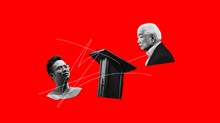
Almost half of all evangelicals say their income is not enough to pay the bills, one-third say it's hard to take time off from work to care for their family, and many feel “used up” at the end of the day.
Those are among the findings of the latest General Social Survey (GSS), an ongoing study of the American public conducted every year or two since 1972.
Evangelicals feel nearly the same as the nation at large: 50.4 percent of all Americans told the GSS their income is insufficient. Among faith groups, black Protestants (two-thirds of whom identify as evangelicals) are most likely to say their job alone can’t pay the bills (65%); Jews are least likely to have that concern (24%).
Feeling cash-strapped doesn’t stop evangelicals from working hard. About four in 10 say that at no point in the past week did they not work hard enough, according to the GSS. Fewer than one in 10 say they did not work hard enough during half or more of the week. The responses are essentially identical to Americans overall.
[Unless otherwise specified, all of the 2014 GSS analyses in this article are original to CT, and were conducted using the RELTRAD measure to classify religious affiliations.]
Daily Life Can Take a Toll
According to the GSS, many evangelicals feel worn out by their daily routines. Four out of 10 say, during the past month, they often felt “used up” at the end of the day.
Mental health concerns also affect about a third of evangelicals, at least on an occasional basis. Three out of 10 said their mental health was not good for at least one day out of the past 30. One out of 20 evangelicals says their mental health was not good for 15 or more days out of the past 30. (Nearly one out of 10 Americans overall says the same.)
Mental health concerns vary among faith groups. About 13 percent of evangelicals say they have been diagnosed with depression, compared to 18 percent of mainline Protestants, 9 percent of black Protestants, 14 percent of Catholics, 6 percent of Jews, 24 percent of those from other faiths, and 18 percent of the religiously unaffiliated. Overall, 15 percent of Americans say they have been diagnosed with depression.
A recent LifeWay Research survey that found one out of four pastors “have personally struggled with mental illness,” often undiagnosed. That same survey found that a two-thirds majority of pastors (66%) rarely or never talk about mental illness in sermons or large groups.
Science Makes Life Better, Moves too Fast
The latest GSS also examined popular views about science. The response from evangelicals were mixed.
- One-third (34%) had taken any college-level science course (slightly below the national average of 41%).
- More than half (55%) agree that science makes our way of life change “too fast.” Most (80%) also say that science and technology make our lives better.
- More than two-thirds (69%) say that the universe did not begin with a huge explosion (such as the Big Bang), and three-quarters (76%) say human beings did not “develop from earlier species of animals.”
- Overall about half of Americans (53%) say science is changing our way of life too fast; 82 percent say science is making our lives better. Half say the universe began with an explosion and that humans evolved from animals (53%).
CT has covered human origins extensively, noting how most Americans—Christian and otherwise—do not fall neatly into creationist or evolutionist camps, how theologians view the debate; and how debates help (or hurt) the discussion.
Among other commentary on the latest GSS results:
Tobin Grant notes for RNS that the “nones”—those with no religious preference—are growing. Ed Stetzer, writing for CNN, explained how that doesn’t necessarily mean Christianity is dying; for CT he explains where evangelicals fit in the trend. At The Washington Post, Scott Clement points out that, while worship service attendance and religious affiliation have declined, the practice of daily prayer has stayed about the same (with a slight increase) among Americans. Joe Carter points out for The Gospel Coalition that this might be a problem, as prayer “relies on our knowledge of God, which comes from reading his word”—so unaffiliated non-churchgoers are likely redefining prayer, not practicing it the way Christians might wish.
CT regularly reports on surveys, including the non-Christians who take the Bible literally, the minority Christians some surveys miss, and predictions for the world’s religious makeup in 2050.
[Image Courtesy of Marlo Mancuso - Flickr]

Support Our Work
Subscribe to CT for less than $4.25/month

















